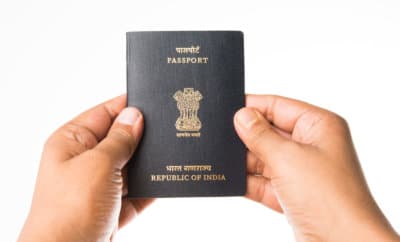Crime
Indian American California Professor Accused of Sexual Harassment

Representational Image
Photo: Bigstock
Gopal Balakrishnan, a professor at the University of California Santa Cruz, denies the allegations.
Gopal Balakrishnan, a professor at the University of California Santa Cruz has been accused by seven people of sexual harassment through a public statement.
The statement, which is available on the internet, has been signed by 137 people. The University told KION546 that it is “deeply troubled by the allegations of sexual misconduct.”
“GB’s behavior has kept women and gender nonconforming people, especially younger people with less social capital, from participating in political and intellectual spaces. How many people have been pushed out of meetings, classrooms, conferences, journals, and social events because of his actions?,” the statement said.
Balakrishnan has denied the allegations. He said that the anonymous accusers were spreading gossip through the public statement.
“This spring I was subject to nearly two and half months of graffiti attacking me in my workplace, accusing me of being a sexual predator, followed more by anonymous leafleting along the same lines, which called for a boycott of my classes, also that I no longer be invited to conferences and that my work be ignored,” Balakrishnan wrote in an email to The Chronicle. He said that the accusers believed that “in the current context of national indignation around the issue of sexual harassment, they might have a better shot.” He has taken a leave for a year, after accusations started surfacing through various means in spring.
Campus spokesperson Scott Hernandez-Jason told the Chronicle that if the allegations were true, they “represent a serious violation of campus policy.” The university is trying to find more information about the allegations, he added.
“Sexual misconduct has no place at UC-Santa Cruz, and we seek to hold perpetrators accountable,” he said. Earlier in 2017, the university said that there was no requirement to conduct an investigation regarding the accusations.
One of the accusers wrote in her statement that he not only hung out with the students socially at bars but that the parties would continue at his house, where drugs would also be present. “If we were to come forward about GB, we would be blamed for UCSC losing one of its few Marxist professors,” said another.
After Harvey Weinstein’s expose, women have come forward in many circles, including politics, to report against sexual predators. In an informal database, an Indian woman studying in the United States had last year compiled a list of South Asian professors who were accused by multiple women of sexual harassment. The list led to multiple debates over the list slandering the teachers, but a section of feminists argued that since men in power tend to abuse their authority, the younger women trying to make a mark in academics are unable to come forward and thus their accusations stayed limited to the informal list.
Earlier, the University of California, Berkeley, School of Law had allowed Dean Sujit Choudhry — also accused of sexual harassment — to continue working in the designation until the accuser filed a legal complaint.
“If you think of maybe the last person on earth who would do this, you would think it would be the dean of one of the most prestigious law schools in the country,” John D. Winer, Tyann Sorrell’s lawyer, told The New York Times last year. Sorrell was Choudhry’s assistant.
According to a 2015 survey conducted by the Association of American Universities at 27 elite private and public research universities, one in 10 female graduate students stated that they have been sexually harassed by a faculty member at her university.
Another study in May 2017 of harassment complaints said that most faculty harassers are accused of physical, not verbal, harassment, and 53 per cent involve alleged serial harassers.
Sexual harassment, gender violence and misconduct is at epidemic levels in the United Kingdom, the Guardian reported following an investigation.
“Young women are often terrified about the consequences if they make a complaint about a staff member. So often, when they do, the university’s chief concern is to downplay any wrongdoing and protect its own reputation by keeping the whole thing quiet,” Dr Ann Olivarius, senior partner at the law firm McAllister Olivarius, told the publication, which found that at least 169 allegations against academic and non-academic staff were made from 2011-12 to 2016-17 at 120 universities in the United Kingdom.



